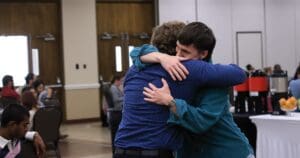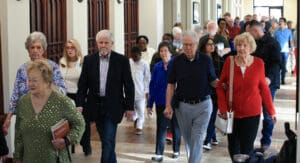
“So, you’re our new Young Adult Minister? Neat. What age range is that?”
That’s a good snapshot of many conversations I’ve had over the past few months. I have discussed this so often that I spent an entire afternoon with a whiteboard trying to sketch out what a “young adult” is in our church. I’d share the picture, but it looks like a crazed football coach’s playbook at halftime. Regardless, I would like to share the nine categories (yeah…NINE!) of what constitutes a “young adult” in our church. Then, I’d like to share what that means for our ministry.
Before I do that, I want to acknowledge that “young” is more of an energy than an age. I know a few 40-somethings with the energy of a 20-something and a few 30-somethings who would thrive in an older small group. Furthermore, these categories are not exhaustive. There is a lot of diversity among the Young Adult Ministry. So, if you read below and think, “I don’t fit any of these categories,” that’s okay. We can learn best when our groups are full of variety.
The Nine Young Adults at FBCA
The 20-Year-Olds.
1. Recent College Graduates (20-24)
I refer to our recent college graduates as “Launchers.” They’re out of school, getting jobs, paying bills, and adjusting to real adulthood. In our current culture, most Launchers are single, but aren’t too worried about it. They believe it will happen one day in God’s timing.
2. Adjusting (25-29)
These young adults are getting comfortable as adults, experiencing some career success (many have switched jobs and are figuring out what they don’t want to do), and getting a handle on life. However, they still have many questions about their future. Their social life is active. Like Launchers, many are single but may sense some anxiety about it. Pressure from their parents, society, or church doesn’t help.
3. Engaged 20s (20-29)
This group is focused on their wedding day. If they are Launchers, they probably dated in college. They are relatively optimistic about the future. Life feels like a blank slate, and they are excited about a house, a successful career, and maybe kids. They need guidance from wise mentors, especially when the newness wears off (when her morning breath is terrible and he leaves the toilet seat up). If they are Adjusting, they are more realistic about marriage. They’ve been in some relationships by now and have a better handle on what they truly want from a partner.
4. MW/oK 20s (20-29)
MW/oK means “married without kids.” Sometimes referred to as DINCs (dual income, no kids). Everything mentioned above about Launchers and Adjusting can be said about MW/oKs, but add a spouse. This group is open to switching careers and moving to a new city if a unique opportunity arises. They are searching for other couple friends. They occasionally feel pressure to have children, but many focus on careers, travel, or don’t want kids yet.
Occasionally, churches combine Engaged and MW/oK 20-year-olds into one group called “Nearly and Newly Married.”
The 30-Year-Olds.
5. Searching and Stabilizing Singles (30-39)
It’s hard to figure out a “name” for our 30-something singles that doesn’t sound insulting. So, I’ve tried to find two words that describe the feelings of singles in their 30s. Some are searching: “Am I in the right career? Will I ever find a spouse? Am I where the Lord wants me?” Some are stabilizing: “I’m right where I need to be in my career. I’m invested in my church and community. If I find a spouse one day, fantastic! If I don’t, my life is still meaningful.” And here’s the kicker: they may vacillate between these two sentiments on any given day.
I have more to say about singleness, but I’ll save it for a future blog. The bottom line is singleness is not a curse. Paul says it can be a blessing (1 Cor. 7:25-40).
6. Engaged 30s (30-39)
Don’t let their age fool you! Engaged 30s need all the help, mentorship, and resources as the Engaged 20s. Also, don’t be surprised if this is a second marriage. The first may have gone awry, but they are committed to making the second one successful. Either way, they may have more stability – a steady career and perhaps a house – but marriage is still hard. They need the support of their church.
7. MW/oK 30s (30-39)
Remember, young adults are having children later in life. There are various reasons for this, so sensitivity is crucial in ministering to them. For some of them, it’s a choice. It’s not a choice for others. They want children but cannot conceive due to health or infertility. For some, career or traveling opportunities are more important. They have goals they want to accomplish before having children. Whatever the case, they really want Mom to stop nagging them about it!
8. Baby/Toddler Families (30-34)
Generally, these families are in their younger 30s. That isn’t always true because couples get married and have children later. What you need to know about these families is that they are tired. Their little ones take all of their energy and effort. Anything the church does to minister to them – breaks, date nights, preschool programming, etc. – is huge. After the birth of our second child, a church member asked what she could do to help us. I told her to rock the baby while Amy napped, and she did! Respite is a true gift.
9. Young Elementary Families (35-39)
Finally, the category in which I find myself. Generally, in their later 30s, these families are just starting to get out of the baby and toddler years. Many still have littles, but their oldest is at the point where they can get themselves dressed, make lunches, and brush their teeth. Slowly but surely, they are reclaiming energy but discovering new challenges to parenting. They suddenly realize that their marriage needs a little work. They have spent several years trying to keep children alive. Now, they need a little tune-up.
Takeaways
So, there you have it. Nine general categories of young adults. Now, what do we make of all this?
First, we can’t make young adults feel guilty about their current category. It’s our job to disciple them. It’s not the goal of discipleship to move from singleness to marriage or from MWoKs to MWiKs (married with kids). Some young adults may want to be in a different place, but the right opportunities haven’t happened yet. Be sensitive and keep the main thing the main thing.
Second, I don’t think we should split into groups based on these categories. I’m not sure that is the best for their discipleship growth. If you heard my sermon last Sunday, I briefly mentioned that similarity is not the basis of community. There are many good reasons we should strive for diversity (in age, life stage, social/economic status, race/ethnicity, etc.) in our discipleship groups. One reason is that we grow when we are challenged. Another reason is that different perspectives help us sort through our own beliefs. What would creating small groups based on making and maturing disciples rather than similarity look like?
Third, our application of Scripture needs to widen. The Bible is vast, and not everyone is in the same place in life. If our application of Scripture only targets 20-something MWoKs, then we’re missing eight other categories. One of the things I love about the Bible is how it applies to everyone reading it. It’s a beautiful fact. The Spirit of God speaks through Scripture regardless of age, race, marital status, nationality, or income. It builds up and equips even the humblest in our gathering. God invites us to find our story in His big story of redemption.
Conclusion
“Am I a young adult?”
I’m not sure it matters. Because in the church, we all belong to one another (Rom. 12:5). I belong to you, you belong to me, and everyone in the church has something valuable that the other needs.
Recent Posts
16 The Pharisees and Sadducees came to Jesus and tested him by asking him to show them a sign from heaven. 2 He replied, “When evening comes, you say, ‘It…
13 That same day Jesus went out of the house and sat by the lake. 2 Such large crowds gathered around him that he got into a boat and sat…
Much has been written over the past couple of years about loneliness in America. One of the most notable documents on the subject is the 2023 Surgeon General’s…
Have you noticed how rare it is to share a meal with someone new these days? We scroll through food photos on Instagram, watch countless cooking shows, and…




